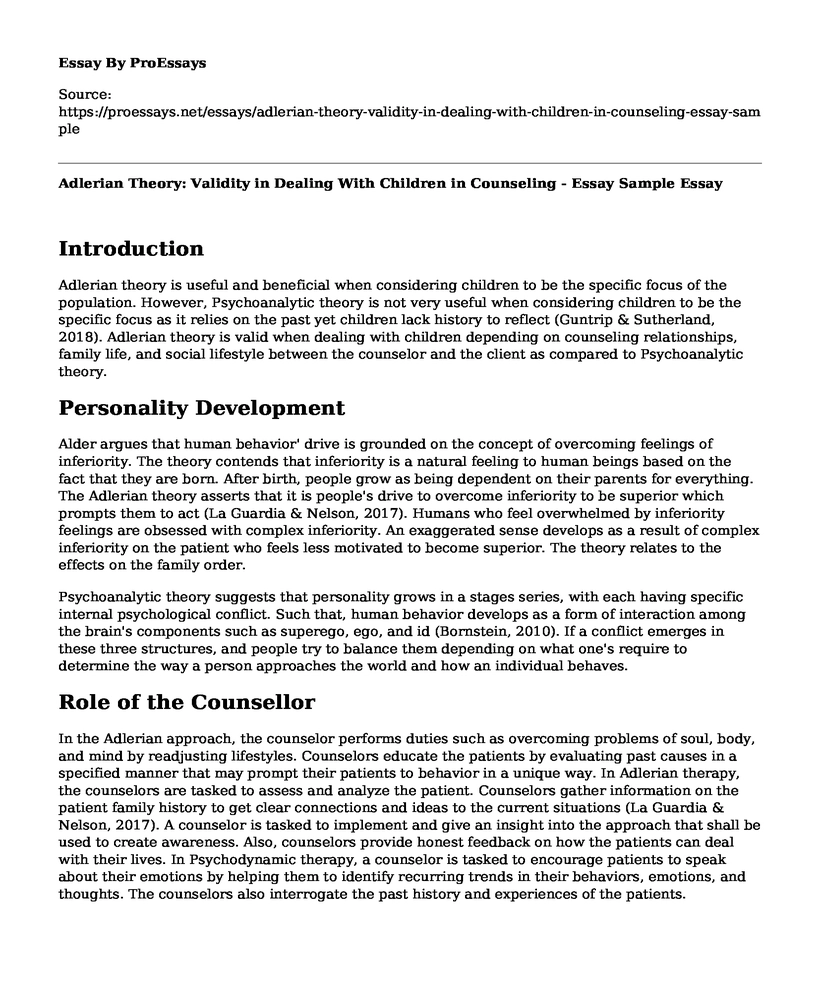Introduction
Adlerian theory is useful and beneficial when considering children to be the specific focus of the population. However, Psychoanalytic theory is not very useful when considering children to be the specific focus as it relies on the past yet children lack history to reflect (Guntrip & Sutherland, 2018). Adlerian theory is valid when dealing with children depending on counseling relationships, family life, and social lifestyle between the counselor and the client as compared to Psychoanalytic theory.
Personality Development
Alder argues that human behavior' drive is grounded on the concept of overcoming feelings of inferiority. The theory contends that inferiority is a natural feeling to human beings based on the fact that they are born. After birth, people grow as being dependent on their parents for everything. The Adlerian theory asserts that it is people's drive to overcome inferiority to be superior which prompts them to act (La Guardia & Nelson, 2017). Humans who feel overwhelmed by inferiority feelings are obsessed with complex inferiority. An exaggerated sense develops as a result of complex inferiority on the patient who feels less motivated to become superior. The theory relates to the effects on the family order.
Psychoanalytic theory suggests that personality grows in a stages series, with each having specific internal psychological conflict. Such that, human behavior develops as a form of interaction among the brain's components such as superego, ego, and id (Bornstein, 2010). If a conflict emerges in these three structures, and people try to balance them depending on what one's require to determine the way a person approaches the world and how an individual behaves.
Role of the Counsellor
In the Adlerian approach, the counselor performs duties such as overcoming problems of soul, body, and mind by readjusting lifestyles. Counselors educate the patients by evaluating past causes in a specified manner that may prompt their patients to behavior in a unique way. In Adlerian therapy, the counselors are tasked to assess and analyze the patient. Counselors gather information on the patient family history to get clear connections and ideas to the current situations (La Guardia & Nelson, 2017). A counselor is tasked to implement and give an insight into the approach that shall be used to create awareness. Also, counselors provide honest feedback on how the patients can deal with their lives. In Psychodynamic therapy, a counselor is tasked to encourage patients to speak about their emotions by helping them to identify recurring trends in their behaviors, emotions, and thoughts. The counselors also interrogate the past history and experiences of the patients.
Techniques
In Adlerian therapy, there are four stages that clients are subjected to which include, reorientation, insight, assessment, and engagement stages. A client strives to overcome the inferiority feeling and acts in a manner of realizing social interest (La Guardia & Nelson, 2017). In psychodynamic therapy, the five techniques used entails dream analysis, free association, Freudian slip, Rorschach Inkblots, and Psychodynamic Diagnostic Manual.
Goals
The ultimate goal of the Adlerian approach is to assist humans to feel confident and comfortable in their own societies and communities. The ultimate purpose of the therapy is dealing with one's feelings of inferiority and anxiety to realize their own sense of belonging (La Guardia & Nelson, 2017). Psychodynamic therapy strives to realize the patient's understanding and self-awareness of the past influence on the current behavior.
Clients and Professionals
The Adlerian approach shall be effective for children's clients while psychodynamic shall be applied for older patients. In psychodynamic therapy, professional discipline covers psychiatric nursing, psychiatry, psychology, and social work (Guntrip & Sutherland, 2018). In Adlerian therapy, professionals include members of the North American Society of Adlerian Psychology.
References
Bornstein, R. F. (2010). Personality, Psychodynamic Models of. The Corsini Encyclopedia of Psychology. doi:10.1002/9780470479216.corpsy0670
Guntrip, H., & Sutherland, J. D. (2018). The Psychodynamic Theory of Melanie Klein. Personality Structure and Human Interaction, 215-233. doi:10.4324/9780429478192-12
La Guardia, A., & Nelson, J. A. (2017). An Adlerian Family Therapist Reflects on Family Therapy Theories and Mentors. Journal of Family Theory & Review, 9(3), 391-402. doi:10.1111/jftr.12200
Cite this page
Adlerian Theory: Validity in Dealing With Children in Counseling - Essay Sample. (2023, Mar 04). Retrieved from https://proessays.net/essays/adlerian-theory-validity-in-dealing-with-children-in-counseling-essay-sample
If you are the original author of this essay and no longer wish to have it published on the ProEssays website, please click below to request its removal:
- The Population, Health Behavior, and the Root Cause of the Behavior
- Essay Sample on Christian Reformers as Heroes
- Essay Sample on Revenge Leads to Pain: A Study of Fictional Characters
- Research on Body Image & Eating Disorders Among East Strasbourg Univ. Students
- Mental Health: Causes, Types, and Management - Essay Sample
- Free Essay Sample on Veterans & Traumatic Stress
- Personality Class - Free Paper Example







